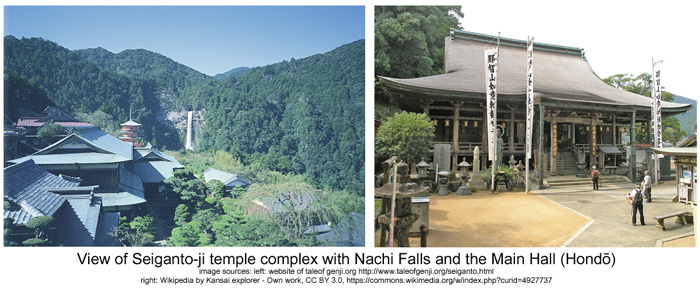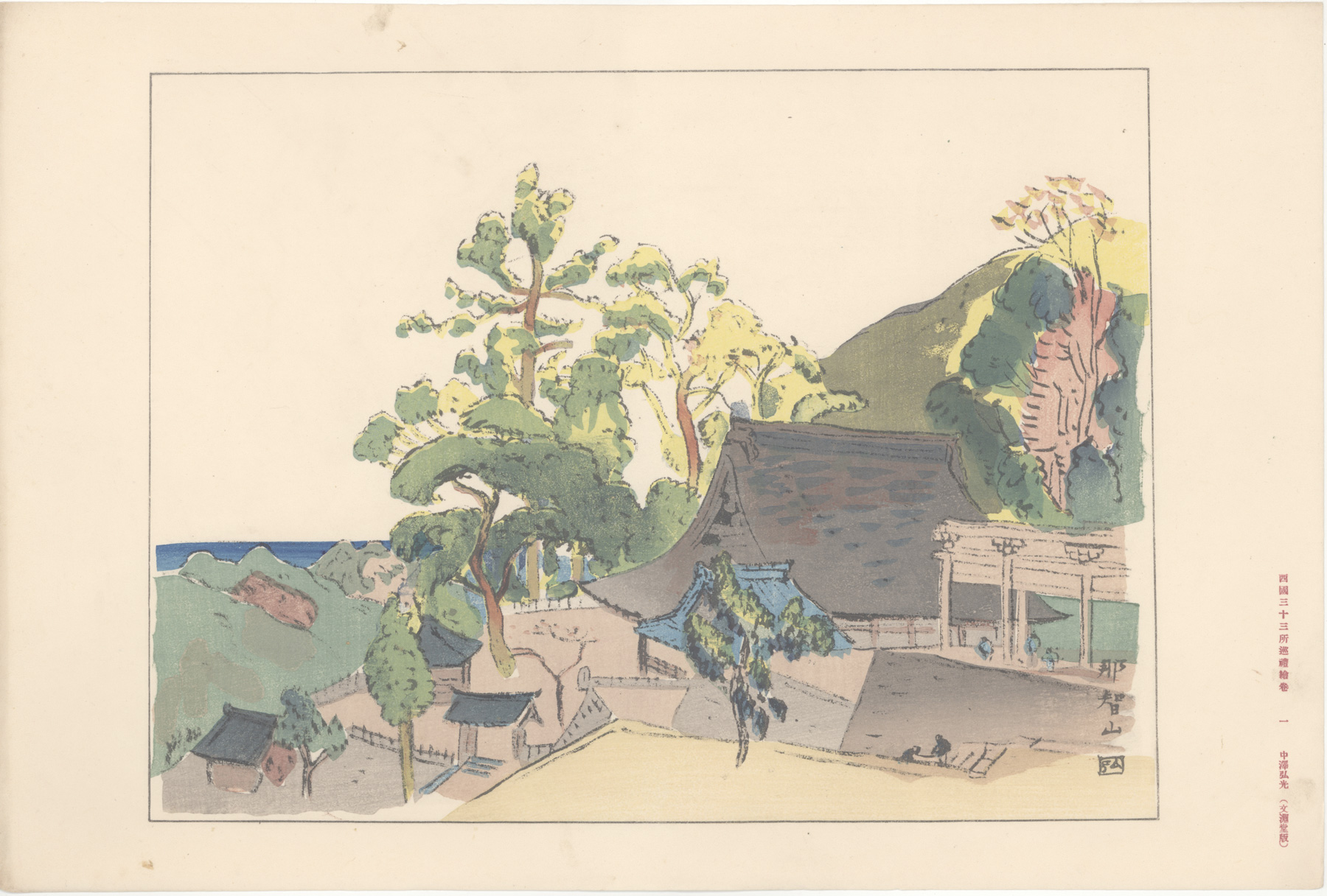About This Print
Nakazawa chooses to show us the rear of the temple complex's main building or honjō, with the Pacific Ocean barely visible on the horizon rather than the most common view of the complex's pagoda with Nachi Falls in the background. I imagine that he chose this less spectacular view to set an initial mood for this album, Nachi-san Seiganto-ji being the first temple on his seventy-eight day pilgrimage to the thirty-three temples of the Saigoku Kannon Pilgrimage, undertaken with his friends the poet Ishikura Suiyō and the artist Akatsuka Chūichi a few months after the Great Kantō Earthquake devastated the Tokyo area.
For more information on their pilgrimage see the article Nakazawa Hiromitsu - Picture Album of the Thirty-Three Pilgrimage Places of the Western Provinces.
The Temple
Sources: Wikipedia https://en.wikipedia.org/wiki/Seiganto-ji; website of Kansai Odyssey http://kansai-odyssey.com/seiganto-ji-temple-first-saigoku-pilgrimage/
Seiganto-ji (青岸渡寺), Temple of Crossing the Blue Shore, is a Tendai Buddhist temple in Wakayama Prefecture. According to legend, the temple was founded in the 4th century by the priest Ragyō Shōnin, a monk from India. The temple was built near Nachi Falls, where it may have previously been a site of nature worship and where Ragyō is said to have found a statue of Kannon in the falls, leading him to build the original temple.
Seiganto-ji is part of the Kumano Sanzan shrine complex, and as such can be considered one of the few jingū-ji (shrine temples) still in existence after the forcible separation of Shinto and Buddhism by the Japanese government during the Meiji restoration.

The Saigoku Kannon Pilgrimage (Saigoku sanjūsansho junrei)
Japan's most famous pilgrimage, originating in the 11th century, encompasses 33 Buddhist temples in Western Japan (Kansai region) dedicated to Kannon (bodhisattva Avalokitasvara), the Bodhisattva of Compassion, who hears the cries of the world and assists anyone in distress.
The 33 temples on the approximately 1,000 kilometer pilgrimage route correspond to Kannon's ability to take on 33 different forms. One hundred thousand pilgrims navigate the route in its entirety or part each year.
Note: For a listing of all 33 temples go to https://en.wikipedia.org/wiki/Saigoku_Kannon_Pilgrimage. To access an interactive map of the route and its temples go to https://www.thetempleguy.org/p/saigoku-33-kannon-route.html and scroll down towards the bottom of the page.
About the "Picture Album of the Thirty-Three Pilgrimage Places of the Western Provinces"
First issued in 1925 and reprinted in 1946, the 1925 album contains 58 prints and the 1946 album 59 prints. For detailed discussion of the two editions and additional information on the Saigoku Kannon Pilgrimage see this site's article Nakazawa Hiromitsu - Picture Album of the Thirty-Three Pilgrimage Places of the Western Provinces.
Print Details
IHL Catalog
#2413.09 Title or Description Nachi-san (Seiganto-ji, temple 1)
那智山 (青岸渡寺、 一) Series Picture Album of the Thirty-Three Pilgrimage Places of the Western Provinces
西国三十三所巡礼画巻 Saigoku sanjūsansho junrei gakan Artist Nakazawa Hiromitsu (1874-1964)
Signature  中澤弘光 [Nakazawa Hiromitsu] printed in lower right margin as shown left
中澤弘光 [Nakazawa Hiromitsu] printed in lower right margin as shown left Seal of the artist  弘 Hiro
弘 Hiro Publication Date Published September 28, 1925 大正十四年九月十八日発行 as printed in the 1925 album's colophon (see Album Box with Print of Kannon IHL Cat. #2413).
Note: an earlier date of June 15, 1925 大正十四年六月十五日 appears in the right margin of the print titled Matsunoo-dera [IHL Cat. #2245], the only print in the 1925 album which carries a date. This earlier date, however, is the date that the censor's approval was obtained, as further explained on this site's web page for Matsunoo-dera, rather than the publishing date. Publisher  文淵堂版 [Bun'endō han] printed in lower right margin as shown left
文淵堂版 [Bun'endō han] printed in lower right margin as shown left
發行者 金尾種次郎 publisher Kanao Tanejirō
發兌元 金尾文淵堂 publishing house Kanao Bun'endō Carver Okada Seijirō 岡田清次郎
Note: the album's colophon (see Album Box with Print of Kannon IHL Cat. 2413) lists two carvers, the above well-known Okada Seijirō and 大倉藤太郎, possibly read Okura Tōtarō, who I can find no information on. Printer Nishimura Kumakichi 西村熊吉
Note: the album's colophon (see Album Box with Print of Kannon IHL Cat. 2413) lists three printers, the above well-known Nishmura Kumakichi; 山県秀助, possibly read Yamagata Hidesuki, who I can find no information on, and 松本兄弟堂, a company founded in Osaka by Matsumoto Kisaburō 松本喜三郎 in 1923, which I believe did the letterpress printing. Impression excellent
Colors excellent Condition excellent - minor marks and soiling
Genre shin hanga; shasei kikō (sketch-tour) Miscellaneous  temple/print number 1 appearing in the right margin of the 1925 release
temple/print number 1 appearing in the right margin of the 1925 release Format horizontal oban
H x W Paper
10 1/8 x 15 1/4 in. (25.7 x 38.7 cm)
H x W Image
8 1/2 x 11 9/16 in. (21.6 x 29.4 cm) Literature Nakazawa Hiromitsu kenkyū: Hon karano kenshō, Hiromitsu Nakazawa, Mitsunobu Satō, et. al., Mitsui Kōkei, Tokyo, 2006, p. 46-48. Collections This Print
National Diet Library Call Number 寄別7-8-2-5 (1925 album, no images displayed); National Library Board, Singapore BRN:9854371 (entire 1946 album, no images shown); British Library System number: 017018582 (entire 1946 album, no images shown); Harvard Yenching Library HOLLIS number 990082993710203941 (1925 album, no images displayed)
| IHL Catalog | #2413.09 |
| Title or Description | Nachi-san (Seiganto-ji, temple 1) 那智山 (青岸渡寺、 一) |
| Series | Picture Album of the Thirty-Three Pilgrimage Places of the Western Provinces 西国三十三所巡礼画巻 Saigoku sanjūsansho junrei gakan |
| Artist | Nakazawa Hiromitsu (1874-1964) |
| Signature |  |
| Seal of the artist |  |
| Publication Date | Published September 28, 1925 大正十四年九月十八日発行 as printed in the 1925 album's colophon (see Album Box with Print of Kannon IHL Cat. #2413). Note: an earlier date of June 15, 1925 大正十四年六月十五日 appears in the right margin of the print titled Matsunoo-dera [IHL Cat. #2245], the only print in the 1925 album which carries a date. This earlier date, however, is the date that the censor's approval was obtained, as further explained on this site's web page for Matsunoo-dera, rather than the publishing date. |
| Publisher |  發行者 金尾種次郎 publisher Kanao Tanejirō 發兌元 金尾文淵堂 publishing house Kanao Bun'endō |
| Carver | Okada Seijirō 岡田清次郎 Note: the album's colophon (see Album Box with Print of Kannon IHL Cat. 2413) lists two carvers, the above well-known Okada Seijirō and 大倉藤太郎, possibly read Okura Tōtarō, who I can find no information on. |
| Printer | Nishimura Kumakichi 西村熊吉 Note: the album's colophon (see Album Box with Print of Kannon IHL Cat. 2413) lists three printers, the above well-known Nishmura Kumakichi; 山県秀助, possibly read Yamagata Hidesuki, who I can find no information on, and 松本兄弟堂, a company founded in Osaka by Matsumoto Kisaburō 松本喜三郎 in 1923, which I believe did the letterpress printing. |
| Impression | excellent |
| Colors | excellent |
| Condition | excellent - minor marks and soiling |
| Genre | shin hanga; shasei kikō (sketch-tour) |
| Miscellaneous |  |
| Format | horizontal oban |
| H x W Paper | 10 1/8 x 15 1/4 in. (25.7 x 38.7 cm) |
| H x W Image | 8 1/2 x 11 9/16 in. (21.6 x 29.4 cm) |
| Literature | Nakazawa Hiromitsu kenkyū: Hon karano kenshō, Hiromitsu Nakazawa, Mitsunobu Satō, et. al., Mitsui Kōkei, Tokyo, 2006, p. 46-48. |
| Collections This Print | National Diet Library Call Number 寄別7-8-2-5 (1925 album, no images displayed); National Library Board, Singapore BRN:9854371 (entire 1946 album, no images shown); British Library System number: 017018582 (entire 1946 album, no images shown); Harvard Yenching Library HOLLIS number 990082993710203941 (1925 album, no images displayed) |
last revision:
1/15/2021 created


